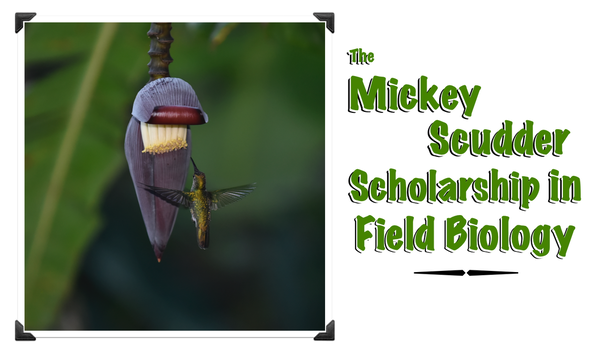Mickey Scudder Scholarship in Field Biology
The Webster Groves Nature Study Society is pleased to announce that applications are being accepted for the Mickey Scudder Scholarship in Field Biology, an annual award to support the fieldwork of a graduate student in natural history. The Scudder grant honors long-time WGNSS member Mickey Scudder, who is well remembered for her infectious enthusiasm towards fieldwork, particularly with wild birds.
The scholarship is eligible to graduate students registered for advanced degrees (M.S., M.A., or Ph.D.) at universities in the Greater St. Louis Metropolitan area. These institutions include St. Louis University, the University of Southern Illinois in Edwardsville, the University of Missouri at St. Louis, and Washington University in St. Louis.
Graduate students planning fieldwork in areas such as ornithology, systematics of plants or animals, entomology, forestry, ecology, behavior, population genetics, etc., or those desiring to attend a field station to take coursework in such areas are invited to apply for the scholarship. The amount to be awarded will be up to $1,000 for one year.
Download 2024 application information and requirements:
| mickey_scudder_scholarship_2024.doc | |
| File Size: | 528 kb |
| File Type: | doc |
Applications to the education committee must include the following:
1. Abstract not exceeding 250 words; summarizing proposed work, how scholarship funds will be used, and brief biography.
2. Summary description (5 pages maximum) of your work in terms understandable to non-technical reviewers. The summary should include; project goals, methodology, and how results will benefit the nature study. Field course applications should identify the course/ institution and how the course will complement home-campus classes.
3. Budget of expected costs. Expenses above the award limit are the responsibility of the awardee.
4. Curriculum vitae of an academic career; education and degrees, institutions and dates, a summary of related courses, grades, conservation activities, etc. Transcripts are not required.
5. Two letters of recommendation from current or former faculty. One must be from your advisor and specify; (a) you are a bona fide student currently registered for a B.A., B.S., M.S., or Ph.D. degree, (b) existing funds do not already cover your expenses, and (c) the award would enhance your work.
Please send it as an electronic submission (<10 MB) to Pete Kozich at [email protected]
Reference: Mickey Scudder Scholarship in Field Biology.
Scholarship Schedule:
1. February 16, 2024. Application deadline. Word or PDF format preferred. Costs may be submitted in Excel.
2. April 2, 2024: Award notifications due to students.
3. May 2024: Recipient presentation at WGNSS general meeting.
4. June 2024: Funds awarded to recipient’s institution. Award is for one year.
5. 2024 to 2025: Recipient’s article to WGNSS Nature Notes journal.
The winner will be invited to the annual WGNSS dinner meeting in May 2024 to receive the award. In early September 2024, the award recipient will give a 20 or 25 minute presentation on the project. Within two years of receiving the funds, the winner is asked to submit a summary article for the WGNSS Nature Note journal and acknowledge the grant in any resulting published material.
The award will be made to the applicant’s institution, which is expected to establish and monitor a fund as appropriate to curate the stipend. The funds may carry over beyond the year of award, if to the benefit of awardee’s research. The funds cannot be used to pay overhead to any institution. Automobile travel is reimbursed at institution’s rate. Expenses for air travel are based on tourist class. Personal expenses should not be included. Scientific supplies and equipment should be itemized. Field course expenses should include tuition, room/board, and travel.
1. Abstract not exceeding 250 words; summarizing proposed work, how scholarship funds will be used, and brief biography.
2. Summary description (5 pages maximum) of your work in terms understandable to non-technical reviewers. The summary should include; project goals, methodology, and how results will benefit the nature study. Field course applications should identify the course/ institution and how the course will complement home-campus classes.
3. Budget of expected costs. Expenses above the award limit are the responsibility of the awardee.
4. Curriculum vitae of an academic career; education and degrees, institutions and dates, a summary of related courses, grades, conservation activities, etc. Transcripts are not required.
5. Two letters of recommendation from current or former faculty. One must be from your advisor and specify; (a) you are a bona fide student currently registered for a B.A., B.S., M.S., or Ph.D. degree, (b) existing funds do not already cover your expenses, and (c) the award would enhance your work.
Please send it as an electronic submission (<10 MB) to Pete Kozich at [email protected]
Reference: Mickey Scudder Scholarship in Field Biology.
Scholarship Schedule:
1. February 16, 2024. Application deadline. Word or PDF format preferred. Costs may be submitted in Excel.
2. April 2, 2024: Award notifications due to students.
3. May 2024: Recipient presentation at WGNSS general meeting.
4. June 2024: Funds awarded to recipient’s institution. Award is for one year.
5. 2024 to 2025: Recipient’s article to WGNSS Nature Notes journal.
The winner will be invited to the annual WGNSS dinner meeting in May 2024 to receive the award. In early September 2024, the award recipient will give a 20 or 25 minute presentation on the project. Within two years of receiving the funds, the winner is asked to submit a summary article for the WGNSS Nature Note journal and acknowledge the grant in any resulting published material.
The award will be made to the applicant’s institution, which is expected to establish and monitor a fund as appropriate to curate the stipend. The funds may carry over beyond the year of award, if to the benefit of awardee’s research. The funds cannot be used to pay overhead to any institution. Automobile travel is reimbursed at institution’s rate. Expenses for air travel are based on tourist class. Personal expenses should not be included. Scientific supplies and equipment should be itemized. Field course expenses should include tuition, room/board, and travel.
